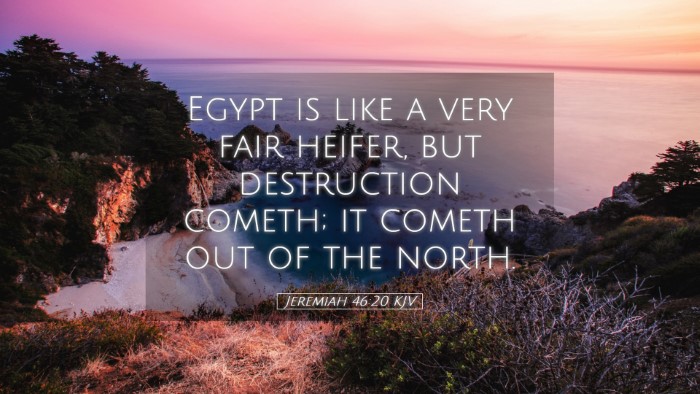Commentary on Jeremiah 46:20
Verse Reference: Jeremiah 46:20 - "Egypt is like a very fair heifer, but destruction cometh; it cometh out of the north."
Introduction
The book of Jeremiah presents a profound exploration of prophecies concerning nations, with a significant focus on the impending judgment of Egypt. In Jeremiah 46:20, the imagery utilized sets forth a vivid illustration of Egypt's fate in the face of invading forces, symbolized by the northern enemy. Drawing insights from esteemed public domain commentaries, we delve into the layers of meaning embedded in this verse.
The Symbolism of Egypt
Jeremiah employs the metaphor of a "very fair heifer" to characterize Egypt. This description reflects its past prosperity and beauty, suggesting a nation that was once strong and vibrant.
- Matthew Henry expounds on this metaphor, indicating that the heifer's beauty symbolizes Egypt's allure and strength. However, he also notes that such beauty is deceptive and that superficial glory can often mask underlying vulnerability.
- Albert Barnes relates the heifer to the agricultural strength and significance of Egypt in the ancient world, which was renowned for its fertile lands and rich resources. Yet, he emphasizes that external traits do not equate to invulnerability.
- Adam Clarke cautions against misinterpreting the heifer as a symbol of permanence. Instead, he points out that despite Egypt's elegance, destruction looms, reflecting the transient nature of worldly power.
The Predictive Nature of the Prophecy
The latter part of the verse, “but destruction cometh; it cometh out of the north,” introduces the prophetic element of impending doom. This destruction signifies God's judgment against Egypt.
- Matthew Henry notes that the phrase indicates a sudden and inevitable calamity approaching from the north, likely representing the invading armies of Babylon. This serves as a divine response to Egypt's historical role as a rival to Israel and a nation that sought to oppose God's purposes.
- Albert Barnes elaborates on the geographic metaphor, suggesting that "from the north" not only points to the direction of the invading force but also signifies the global implications of this judgment. It implies that destruction can come from unexpected sources, emphasizing the sovereignty of God over all nations.
- Adam Clarke connects the northern invaders' approach to the broader biblical theme of judgment coming upon nations that elevate themselves against God's will. This points to a recurring biblical motif where pride precedes a fall.
Theological Implications
The implications drawn from Jeremiah 46:20 extend beyond Egypt and speak to universal truths regarding divine judgment and the fate of nations.
- Matthew Henry reflects on the theme of hubris, indicating that there's a stark lesson regarding nations that trust in their might and beauty rather than in God. Such nations may find themselves vulnerable to unforeseen destruction.
- Albert Barnes highlights God's providential hand in history, reminding readers that no nation is beyond His reach. The prophecy serves as a stark warning that complacency in a nation's fortunes can lead to devastation.
- Adam Clarke addresses the moral dimension of the passage, underscoring the importance of humility before God. This relates to contemporary nations that might echo the characteristics of ancient Egypt.
Application for Today
As modern readers of Scripture, especially pastors and theologians, there are several key takeaways from Jeremiah 46:20.
- The Illusion of Security: The allure of external prosperity should not lead to complacency. The Church is called to stand firm in the faith and to rely on God rather than on worldly achievements.
- God’s Sovereignty: This passage serves as a reminder that God remains sovereign over the nations. Believers are called to trust in His plans, even amidst global turmoil and uncertainty.
- Moral Responsibility: Nations, like individuals, are accountable before God. Pastors can use this verse to preach the importance of repentance and social justice, emphasizing that divine judgment is not absent in contemporary society.
Conclusion
Jeremiah 46:20 is a profound declaration that encapsulates the beauty and fragility of human power, revealing God's ultimate authority over nations. Through careful examination of commentary insights, readers are urged to reflect on the broader implications of this prophecy, encouraging a deeper faithfulness to God's mission amidst an ever-changing world.


